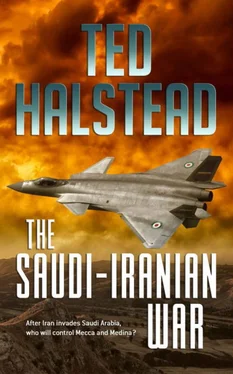Ted Halstead - The Saudi-Iranian War
Здесь есть возможность читать онлайн «Ted Halstead - The Saudi-Iranian War» весь текст электронной книги совершенно бесплатно (целиком полную версию без сокращений). В некоторых случаях можно слушать аудио, скачать через торрент в формате fb2 и присутствует краткое содержание. Год выпуска: 2019, Издательство: Independently published, Жанр: Боевая фантастика, Триллер, на английском языке. Описание произведения, (предисловие) а так же отзывы посетителей доступны на портале библиотеки ЛибКат.
- Название:The Saudi-Iranian War
- Автор:
- Издательство:Independently published
- Жанр:
- Год:2019
- ISBN:нет данных
- Рейтинг книги:4 / 5. Голосов: 1
-
Избранное:Добавить в избранное
- Отзывы:
-
Ваша оценка:
- 80
- 1
- 2
- 3
- 4
- 5
The Saudi-Iranian War: краткое содержание, описание и аннотация
Предлагаем к чтению аннотацию, описание, краткое содержание или предисловие (зависит от того, что написал сам автор книги «The Saudi-Iranian War»). Если вы не нашли необходимую информацию о книге — напишите в комментариях, мы постараемся отыскать её.
The Saudi-Iranian War — читать онлайн бесплатно полную книгу (весь текст) целиком
Ниже представлен текст книги, разбитый по страницам. Система сохранения места последней прочитанной страницы, позволяет с удобством читать онлайн бесплатно книгу «The Saudi-Iranian War», без необходимости каждый раз заново искать на чём Вы остановились. Поставьте закладку, и сможете в любой момент перейти на страницу, на которой закончили чтение.
Интервал:
Закладка:
Abdul smiled. “Exactly. And even if the monarchy had enough money to keep the lights on for a while without a continuous flow of oil money, the shock of an immediate future with no source of national income would be enough to provoke the revolution we need to rid ourselves of the House of Saud.”
Farhad shrugged. “Very well, that leaves the obvious question — How do you propose to cut off the petroleum income that keeps the Saudi monarchy in power?”
Abdul grinned and punched Farhad in the shoulder. “Remember when we watched an old Bond film where the conclusion was set in the Middle East while we were in college?”
Farhad rubbed his shoulder, sighed and nodded. “Yes, I remember you saying the plan to use nuclear weapons could never have worked in Saudi Arabia. You said that the fools running the country had depleted the underground aquifers like those shown in the film to grow wheat. I also remember you saying they did it when some in the West threatened a food boycott to match the OPEC oil boycott, and the Saudi monarchy decided self- sufficiency in wheat was critical. But they grew the best wheat for desert conditions, which turned out to make bread no Saudi would eat. So they exported the wheat at world market prices, about five percent of the cost of production. And so much of the groundwater is gone, and most drinking water is now from desalination plants, produced at enormous expense and piped hundreds of miles inland.”
Abdul nodded. “I have always known your memory was impressive. But did you ever consider the use of a nuclear weapon to contaminate the Saudi oil reserves and make petroleum from them impossible to sell abroad?”
Farhad shrugged. “Two problems immediately come to mind. First, how would we get a nuclear weapon? Second, how could we deliver it to the target?”
Abdul smiled. “When i saw you a few months ago, you mentioned you had an uncle who had gone back to teaching after the deal the Americans reached with the Iranian government shut down its nuclear program. Are you still in touch with him now that the deal is off?”
Prince Ali bin Sultan looked around him at the others at the conference room table at the Ministry of Defense. At the head of the table was the Crown Prince, the Defense Minister. Everyone else at the table was either a field commander in Yemen like him, or one of their counterparts in the Ministry.
Ali and the Crown Prince were the only ones at the table who were both princes, and had trained at the United States Armor School. The Crown Prince had gone in 2010 just after the Armor School moved to Fort Benning, while Ali had gone almost a decade later. It still gave them a connection that Ali knew everyone else at the table envied, particularly Prince Khaled bin Fahd.
Khaled had gone to No. 1 Flying Training School in the UK, which claimed to be the oldest continuously operating military pilot school in the world, and was there for its 100th-anniversary celebration in 2019. He had gone to become a Eurofighter Typhoon pilot, which Ali had thought an odd choice considering that the RSAF also flew the F-15. Until Ali read an article quoting US Air Force Chief of Staff General John Jumper, the only pilot who had flown both the Typhoon and the F-22 Raptor, praising the Typhoon as “absolutely top notch.”
Ali had learned several American idioms while he was at Fort Benning.
The one that applied here, he thought, was “Even a stopped clock is right twice a day.”
The Crown Prince put down the folder he had been reading from and looked around the table, which everyone knew was the signal that the meeting was going to start. He spoke into the sudden silence.
“You have all seen the casualty reports from the missile that detonated here yesterday.”
They all nodded. Over a hundred had died and many more had been wounded after the hit collapsed an apartment building, though exact numbers would take days to establish. Rescue crews were still finding survivors, though they were finding far more bodies. Nearly all of its residents were Saudis, which had led to surprise in the Western press, where they seemed to think all Saudis lived in palaces.
That had never been true, even in the 1970s when Saudi per capita income at about 40,000 US dollars had been one of the world’s highest. Now that number had been cut in half, thanks to a population that had tripled over the past thirty years. So now, Saudi per capita income of about 20,000 dollars a year was a third of the 60,000 dollar a year level in the US.
Plenty of Saudis lived in apartments.
“His Majesty has instructed me that no more missiles may strike the Kingdom. We are here to decide how best to accomplish this. Ali, you have spoken before about changes to our strategy in Yemen.”
All heads swiveled towards Ali, who nodded.
“Yes, Minister. I’ve proposed before that we move more of our M1A2 Abrams tanks to Yemen. I think we should increase the number deployed there to four hundred. I also recommend that we distribute our forces at the platoon level, which will let us respond to any reported missile launch site far more quickly.”
Ali paused. “I will defer to my colleague from the Air Force regarding air deployments.”
The Crown Prince smiled. “Not so fast, Ali. I called this meeting for options. Let’s hear yours, all of it. Khaled will get his say.”
Ali nodded dutifully. “Very well. I believe missile launch sites should have an absolute air targeting priority. We will, of course, still move Abrams platoons on any reported site. However, in many cases, an air strike could get there first.”
The Crown Prince smiled. “I would recommend close communication, to ensure you don’t arrive at the same time.”
Everyone laughed at the image, though internally Ali winced. So far he hadn’t been impressed by the aim of Khaled’s pilots, and wouldn’t be surprised by a battlefield accident — even a little.
The Crown Prince turned his head. “Khaled, what do you think?”
Khaled’s expression was impassive, though Ali knew that internally he had to be seething at a tanker making deployment suggestions for his precious planes. This time, though, he was surprised.
“I agree with Ali. After the casualties caused by this attack, missile launch sites must take targeting priority over troop concentrations.”
Khaled then turned towards Ali, who was still absorbing this first-ever agreement from his rival.
“I am not a tanker, but if four hundred M1A2s are deployed to Yemen, how many will be left to defend the Kingdom?”, Khaled asked.
And there it is, Ali thought bitterly, even as he answered. “We will still have two hundred Abrams in the Kingdom, as well as several hundred M60s.”
The Crown Prince’s eyebrows rose, and he said dryly, “Let’s not forget the AMX-30s.”
Ali winced internally again, though he was still successful in keeping his expression impassive. They had bought the AMX-30s from France decades ago, and though they were carried on the books as “reserve” tanks, Ali knew as well as the Crown Prince did they’d never be taken out of storage again.
“As you know, the M60s are still in active service and are a match for the armor fielded by the enemies on or near our borders, except for the Israelis. I have seen nothing from our colleagues in the GIP suggesting that either the Israelis or anyone else is planning to attack us. Besides, we’ll have nearly the entire force in Saada province, just over the border from the Kingdom. That’s not going to change, because their missiles barely have the range to make it to Riyadh. If we need to, we can get back in a hurry using the rail line we just built to Jaizan.”
What Ali had just said had been… mostly true. The General Intelligence Presidency (GIP), the Saudi equivalent of the American CIA, had not warned of anyone besides the Houthis even potentially planning to attack. The M60s were a match for the T-72s that constituted the bulk of the Syrian Army’s armor, and one of the few realistic scenarios of a land attack against Saudi
Читать дальшеИнтервал:
Закладка:
Похожие книги на «The Saudi-Iranian War»
Представляем Вашему вниманию похожие книги на «The Saudi-Iranian War» списком для выбора. Мы отобрали схожую по названию и смыслу литературу в надежде предоставить читателям больше вариантов отыскать новые, интересные, ещё непрочитанные произведения.
Обсуждение, отзывы о книге «The Saudi-Iranian War» и просто собственные мнения читателей. Оставьте ваши комментарии, напишите, что Вы думаете о произведении, его смысле или главных героях. Укажите что конкретно понравилось, а что нет, и почему Вы так считаете.












